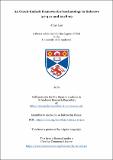Files in this item
An Urzeit-Endzeit framework of eschatology in Hebrews 3:7-4:11 and 12:18-29
Item metadata
| dc.contributor.advisor | Moffitt, David M. | |
| dc.contributor.author | Lee, Jihye | |
| dc.coverage.spatial | 208 p. | en_US |
| dc.date.accessioned | 2019-04-04T13:59:57Z | |
| dc.date.available | 2019-04-04T13:59:57Z | |
| dc.date.issued | 2019-06-24 | |
| dc.identifier.uri | https://hdl.handle.net/10023/17449 | |
| dc.description.abstract | Many scholars argue that the author of Hebrews envisions the transcendent, heavenly world as the eschatological inheritance of God’s people. This view is derived from the understanding that Hebrews’ cosmology reflects a dualism between the spiritual/heavenly and the material/earthly. According to some of these scholars, the author quotes Gen 2:2 in Heb 3:7-4:11 in order to highlight the transcendence of the eschatological rest. Israel’s possession of the land of Canaan in the passage simply functions to symbolize or foreshadow the true, heavenly inheritance. These scholars also claim that, in Heb 12:18-29, the author envisages the immaterial, heavenly world which will come after the destruction of the shakable creation. This view, however, does not properly explain the author’s emphasis on Jesus’ role in creation and his inheritance of all creation, and on the continuity between Israel’s rest in the promised land and the eschatological rest for his readers that the author presents in Heb 3:7-4:11. I argue that a version of an Urzeit-Endzeit eschatological framework, as observed in some Jewish apocalyptic texts, provides a plausible background against which the arguments of Hebrews are most comprehensively explained. These texts share the hope that the primordial bliss that Adam enjoyed in Eden, which God allowed Israel to experience in their history albeit temporarily and partially, will be fully restored at the eschaton. In Heb 3:7- 4:11, the author argues that God’s rest, which the wilderness generation of Israel forfeited remains open for his readers because it shares the core elements of the eschatological rest, i.e. God’s presence (in the temple) and the renewal of creation (of which the changed heart is a core element). In Heb 12:18-29, the author envisions the unshakable kingdom that consists of the revealed heavenly world and the renewed creation as the eschatological venue of God’s dwelling place with his people. | en_US |
| dc.language.iso | en | en_US |
| dc.publisher | University of St Andrews | |
| dc.rights | Attribution-NonCommercial-NoDerivatives 4.0 International | * |
| dc.rights.uri | http://creativecommons.org/licenses/by-nc-nd/4.0/ | * |
| dc.subject.lcc | BS2775.6E7L4 | |
| dc.title | An Urzeit-Endzeit framework of eschatology in Hebrews 3:7-4:11 and 12:18-29 | en_US |
| dc.type | Thesis | en_US |
| dc.type.qualificationlevel | Doctoral | en_US |
| dc.type.qualificationname | PhD Doctor of Philosophy | en_US |
| dc.publisher.institution | The University of St Andrews | en_US |
| dc.rights.embargoreason | Embargo period has ended, thesis made available in accordance with University regulations | en |
| dc.identifier.doi | https://doi.org/10.17630/10023-17449 |
The following licence files are associated with this item:
This item appears in the following Collection(s)
Except where otherwise noted within the work, this item's licence for re-use is described as Attribution-NonCommercial-NoDerivatives 4.0 International
Items in the St Andrews Research Repository are protected by copyright, with all rights reserved, unless otherwise indicated.


